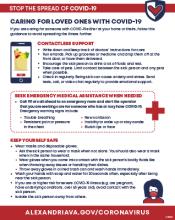Caring for Loved Ones with COVID-19
Page updated on January 12, 2022 at 8:37 AM
XWARNING: You have chosen to translate this page using an automated translation system.
This translation has not been reviewed by the City of Alexandria and may contain errors.
If you are caring for someone with COVID-19 either at your home or theirs, follow this guidance to avoid spreading the illness further.
Contactless Support

Caring for Loved Ones with COVID-19
- Write down and keep track of doctors’ instructions for care
- Run errands. Pick up groceries or medicine and drop them off at the front door, or have them delivered.
- Encourage the sick person to drink a lot of fluids and rest.
- Take care of pets. Limit contact between the sick person and any pets when possible.
- Check in regularly. Being sick can cause anxiety and stress. Send texts, call, or video chat regularly to provide emotional support.
Seek Emergency Medical Assistance When Needed
Call 911 or call ahead to an emergency room and alert the operator that you are seeking care for someone who has or may have COVID-19. Emergency warning signs include:
- Trouble breathing
- Persistent pain or pressure in the chest
- New confusion
- Inability to wake up or stay awake
- Bluish lips or face
Keep Yourself Safe
- Wear masks and disposable gloves.
- Ask the sick person to wear a mask when not alone. You should also wear a mask when in the same household.
- Wear gloves when you come into contact with the sick person’s bodily fluids like when throwing away tissues or handling their dishes.
- Throw away gloves in a lined trash can and wash hands immediately.
- Wash your hands with soap and water for 20 seconds often, especially after being near the sick person.
- If you are at higher risk for severe COVID-19 illness (e.g. are pregnant, have underlying conditions, over 65 years old), avoid contact with the sick person.
- Isolate the sick person away from others.
- Use separate bedrooms and bathrooms.
- If separate rooms are not possible, open windows and ensure good airflow.
- Eat in a separate room from the sick person and wash dishes with soap and hot water or in a dishwasher.
- Maintain at least six feet of distance from the sick person.
- Do not share personal items, including dishware, towels and bedding, or electronics.
Clean and Disinfect the Environment
- Clean and disinfect high-touch surfaces, such as door knobs, light switches, tables, faucets, toilets, sinks, and electronics. Most household disinfectants are safe and effective. Follow instructions on the label.
- If the sick person has their own bedroom and bathroom and is well enough, they can clean their area.
- If a bathroom is being shared, the person who is sick should clean after each use.
- If this is not possible, wear a mask and wait as long as possible after the sick person has used the bathroom before entering to clean and use the bathroom.
- Dirty laundry tips:
- Wear disposable gloves when:
- Handling dirty laundry
- Cleaning clothes hampers
- Do not shake dirty laundry.
- You can combine the sick person’s laundry with other people’s items--wash on the warmest water setting possible.
- Laundry should be dried completely, on hot if possible.
- Wash hands after taking off your gloves.
- Wear disposable gloves when:
- Trash tips:
- Place contaminated items in a lined trash can and use gloves when handling. Wash hands afterwards.
Track Your Health
- If you’ve spent 15 minutes or more (cumulatively over 24 hours) within six feet of the sick person, you are considered a close contact.
- Avoid going to work or spending time around others until care is complete. You can leave your home 5 days after your last close contact with the sick person if you do not develop symptoms.
- Monitor your health for COVID-19 symptoms and get tested if needed. Call 911 if you are having trouble breathing.